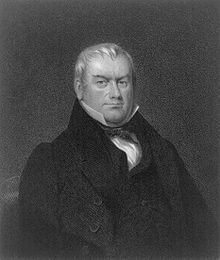George Wolf
| George Wolf | |
|---|---|
 |
|
| 7th Governor of Pennsylvania | |
|
In office December 15, 1829 – December 15, 1835 |
|
| Preceded by | John Andrew Shulze |
| Succeeded by | Joseph Ritner |
| Member of the U.S. House of Representatives from Pennsylvania's 8th district |
|
|
In office 1824–1829 |
|
| Preceded by |
Thomas J. Rogers, Samuel D. Ingham |
| Succeeded by |
Peter Ihrie, Jr., Samuel A. Smith |
| Member of the Pennsylvania House of Representatives | |
|
In office 1814 |
|
| Personal details | |
| Born |
August 12, 1777 Allen Township, Pennsylvania |
| Died | March 11, 1840 (aged 62) Philadelphia, Pennsylvania |
| Resting place | Harrisburg Cemetery |
| Political party | Democratic Party |
| Spouse(s) | Mary Erb (1798–1833; her death) |
George Wolf (August 12, 1777 – March 11, 1840) was the seventh Governor of Pennsylvania from 1829 to 1835. On June 29, 1888, he was recognized as the “father of the public-school system” in Pennsylvania by the erection of a memorial gateway at Easton.
Wolf was born in Allen Township, Pennsylvania. His parents, George and Mary Wolf, had immigrated from Alsace, a then-province of the Holy Roman Empire, in 1751. George Wolf was educated at a classical school, taught for some time, and then studied law. He was admitted to the bar in 1799 and commenced practice in Easton, Pennsylvania. He became a member of the Republican Party at the start of Thomas Jefferson's administration, and was appointed postmaster of Easton, which office he filled in 1802 and 1803. He was clerk of the orphans’ court of Northampton County, Pennsylvania, from 1803 to 1809. He was a member of the Pennsylvania House of Representatives in 1814.
Wolf married Mary Erb (1781–1833) of Lancaster, Pennsylvania, on June 5, 1798. The couple had eight sons and one daughter.
Wolf was elected without opposition to the United States House of Representatives in 1824 to the Eighteenth Congress to fill the vacancy caused by the resignation of Thomas J. Rogers. He was reelected to the Nineteenth, Twentieth, and Twenty-first Congresses. He took the protectionist side in debates on the tariff.
...
Wikipedia
